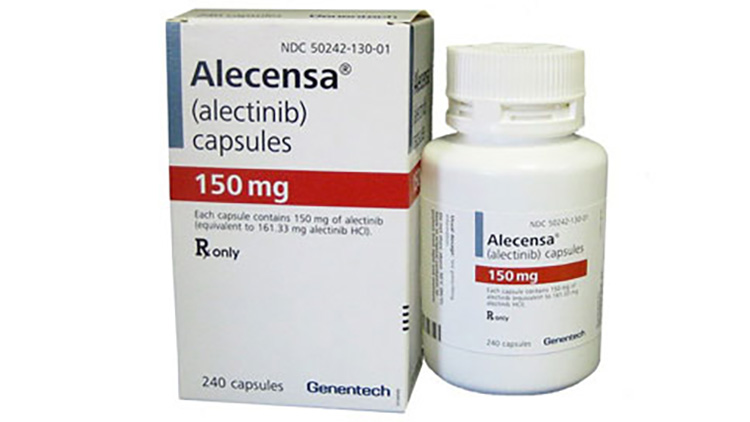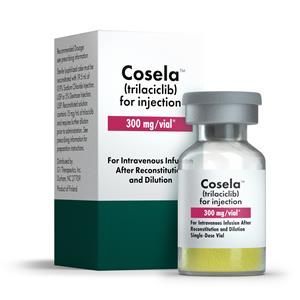Alecensa (alectinib) vs Cosela (trilaciclib)
Alecensa (alectinib) vs Cosela (trilaciclib)
Alecensa (alectinib) is an oral medication specifically indicated for the treatment of ALK-positive non-small cell lung cancer (NSCLC), functioning as an ALK inhibitor to block the activity of the ALK protein, which can contribute to cancer cell growth. On the other hand, Cosela (trilaciclib) is designed to protect bone marrow cells from the damage caused by chemotherapy; it is not a cancer treatment on its own but is used to reduce the occurrence of chemotherapy-induced bone marrow suppression in patients receiving certain types of chemotherapy for extensive-stage small cell lung cancer (SCLC). When deciding between these two medications, it is crucial to consider the type of lung cancer being treated and the goal of therapy, as Alecensa is a targeted cancer therapy for a specific mutation in NSCLC, while Cosela is an adjunctive treatment used to protect bone marrow during chemotherapy for SCLC.
Difference between Alecensa and Cosela
| Metric | Alecensa (alectinib) | Cosela (trilaciclib) |
|---|---|---|
| Generic name | Alectinib | Trilaciclib |
| Indications | Used for the treatment of ALK-positive metastatic non-small cell lung cancer (NSCLC) | Used to decrease the incidence of chemotherapy-induced myelosuppression in adult patients when administered prior to a platinum/etoposide-containing regimen or topotecan-containing regimen for extensive-stage small cell lung cancer (ES-SCLC) |
| Mechanism of action | Anaplastic lymphoma kinase (ALK) inhibitor | Cyclin-dependent kinase (CDK) inhibitor |
| Brand names | Alecensa | Cosela |
| Administrative route | Oral | Intravenous |
| Side effects | Fatigue, constipation, edema, myalgia, anemia, elevated liver enzymes, among others | Fatigue, hypocalcemia, increased aspartate aminotransferase, increased alanine aminotransferase, headache, pneumonia, among others |
| Contraindications | Hypersensitivity to alectinib or any component of the formulation | Hypersensitivity to trilaciclib or any component of the formulation |
| Drug class | Tyrosine kinase inhibitor | Cyclin-dependent kinase inhibitor |
| Manufacturer | Genentech (a member of the Roche Group) | G1 Therapeutics, Inc. |
Efficacy
Alecensa (Alectinib) Efficacy in Lung Cancer
Alecensa (alectinib) is a targeted therapy approved for the treatment of non-small cell lung cancer (NSCLC) with specific genetic alterations. It is particularly effective in NSCLC patients who have anaplastic lymphoma kinase (ALK) positive tumors, as determined by an FDA-approved test. Alectinib works by inhibiting the activity of the ALK protein, which can promote the growth of cancer cells in individuals with this mutation. Clinical trials have demonstrated that alectinib is effective in slowing the progression of ALK-positive NSCLC and can lead to higher response rates compared to chemotherapy and other ALK inhibitors.
In a pivotal phase III trial, the ALEX study, alectinib showed a significant improvement in progression-free survival (PFS) compared to crizotinib, another ALK inhibitor, in previously untreated ALK-positive NSCLC patients. The study also indicated that alectinib was more effective in controlling brain metastases, a common complication of lung cancer, suggesting a better central nervous system (CNS) penetration. The overall survival data also favored alectinib, although the results did not reach statistical significance at the time of interim analysis.
Cosela (Trilaciclib) Efficacy in Lung Cancer
Cosela (trilaciclib) is a different type of drug, known as a cyclin-dependent kinase (CDK) 4/6 inhibitor, which is used to help protect bone marrow function during chemotherapy for the treatment of extensive-stage small cell lung cancer (ES-SCLC). Trilaciclib is administered before chemotherapy to reduce the occurrence of chemotherapy-induced myelosuppression, which is the damage to bone marrow cells leading to reduced blood cell counts. By protecting bone marrow cells, trilaciclib aims to improve patient outcomes by allowing them to receive chemotherapy on schedule and potentially at higher doses.
The efficacy of trilaciclib in lung cancer was demonstrated in several clinical trials where it was shown to significantly reduce the incidence of severe neutropenia, a condition characterized by low levels of neutrophils, a type of white blood cell important for fighting infections. In these studies, patients with ES-SCLC who received trilaciclib before their chemotherapy regimen experienced fewer complications related to neutropenia, such as severe infections and hospitalizations, and were less likely to require interventions like granulocyte colony-stimulating factors (G-CSFs) to boost white blood cell counts. While trilaciclib is not a treatment for lung cancer itself, its role in supportive care is considered an important advancement in managing the side effects of chemotherapy.
Regulatory Agency Approvals
Alecensa
-
European Medical Agency (EMA), European Union

-
Food and Drug Administration (FDA), USA

-
Health Canada

-
Pharmaceuticals and Medical Devices Agency (PMDA), Japan

-
Therapeutic Goods Administration (TGA), Australia

-
Medsafe (NZ)

Cosela
-
Food and Drug Administration (FDA), USA

Access Alecensa or Cosela today
If Alecensa or Cosela are not approved or available in your country (e.g. due to supply issues), you can access them via Everyone.org.
How it works

Make an enquiry
Choose the medicine you want to buy, answer a couple of questions, and upload your prescription to speed things up. We’ll get back to you within 24 hours.


Make an enquiry
Choose the medicine you want to buy, answer a couple of questions, and upload your prescription to speed things up. We’ll get back to you within 24 hours.


Breeze through the paperwork
We'll guide you through the required documents for importing unapproved medicine, ensuring you have all the necessary information.


Get a personalized quote
We’ll prepare a quote for you, including medicine costs and any shipping, administrative, or import fees that may apply.


Receive your medicine
Accept the quote and we’ll handle the rest - sourcing and safely delivering your medicine.

Some text on this page has been automatically generated. Speak to your physician before you start a new treatment or medication.
Let's talk
If you have any questions, call us or send us a message through WhatsApp or email:
Contact us




